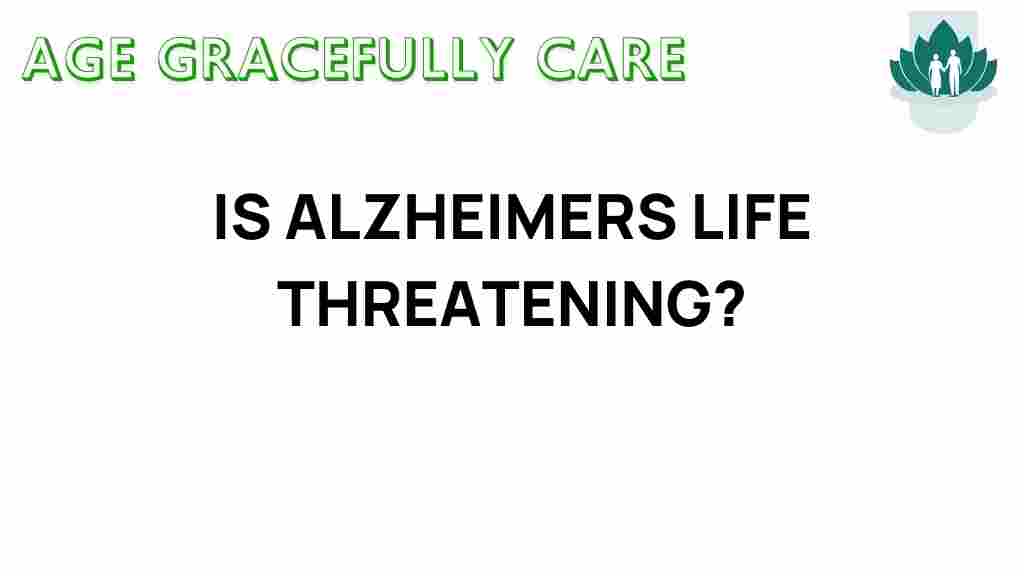Is Alzheimer’s Life-Threatening? Understanding the Risks and Realities
Alzheimer’s disease is a complex and devastating neurological disorder that primarily affects the elderly population. As one of the most common forms of dementia, it not only impacts the cognitive abilities of individuals but also poses significant health risks that can be life-threatening. In this article, we will unpack the realities of Alzheimer’s, its prognosis, the associated health risks, and the challenges faced by caregivers. Understanding these factors is crucial for raising awareness about this condition and improving elderly care.
What is Alzheimer’s Disease?
Alzheimer’s is a progressive neurological disorder that causes brain cells to degenerate and die. It is characterized by memory loss, confusion, and a decline in cognitive function. Over time, individuals with Alzheimer’s may struggle with basic daily tasks, making it one of the leading causes of disability among older adults.
The Life-Threatening Nature of Alzheimer’s
While Alzheimer’s itself may not be classified as a terminal illness, it can lead to life-threatening complications. The progression of Alzheimer’s can severely impact a person’s health, leading to various risks that can ultimately result in death. Here are some of the significant health risks associated with Alzheimer’s:
- Increased Vulnerability to Infections: Individuals with Alzheimer’s may have difficulty communicating their needs or understanding their surroundings, making them more susceptible to infections, particularly pneumonia.
- Malnutrition and Dehydration: As cognitive abilities decline, individuals may forget to eat or drink, leading to malnutrition and dehydration, which can be life-threatening.
- Falls and Injuries: The confusion and disorientation associated with Alzheimer’s can increase the risk of falls, leading to serious injuries or complications.
- Other Health Conditions: Alzheimer’s may exacerbate existing health issues, such as heart disease or diabetes, further complicating the individual’s medical condition.
Prognosis for Alzheimer’s Patients
The prognosis for individuals diagnosed with Alzheimer’s varies widely. On average, individuals live 4 to 8 years after diagnosis, but some may live as long as 20 years. The stage of the disease at diagnosis, overall health, and access to care can all influence longevity. It’s essential to recognize that while Alzheimer’s leads to cognitive decline, the ultimate cause of death often stems from complications related to the disease.
Understanding Dementia and Its Implications
Dementia is an umbrella term that encompasses a range of neurological disorders, including Alzheimer’s. It is characterized by a decline in memory, reasoning, and other cognitive functions. Understanding the implications of dementia is vital for both patients and caregivers.
Types of Dementia
While Alzheimer’s is the most common type of dementia, there are several other forms, including:
- Vascular Dementia: Often caused by reduced blood flow to the brain, this type can occur after a stroke.
- Lewy Body Dementia: Characterized by abnormal protein deposits in the brain, it can cause hallucinations and fluctuating cognitive abilities.
- Frontotemporal Dementia: This affects the frontal and temporal lobes of the brain and is marked by changes in personality and behavior.
Health Risks Associated with Dementia
Similar to Alzheimer’s, other types of dementia also present health risks that can be life-threatening. These include complications from falls, infections, and the inability to manage daily health needs. Awareness of these risks can help caregivers provide better support and care.
The Role of Caregiving in Alzheimer’s and Dementia
Caregiving for individuals with Alzheimer’s or other forms of dementia can be both rewarding and challenging. Caregivers play a crucial role in managing the health and well-being of their loved ones. Here are some important aspects of caregiving:
Challenges Faced by Caregivers
Caregivers often face unique challenges, including:
- Emotional Stress: Watching a loved one decline can be emotionally taxing and lead to feelings of grief and loss.
- Physical Strain: The demands of caregiving can lead to physical exhaustion, particularly when assisting with mobility and personal care.
- Financial Burden: The costs associated with caregiving, including medical care, can add significant financial stress.
Strategies for Effective Caregiving
To support caregivers and improve the quality of care for individuals with Alzheimer’s, consider the following strategies:
- Education and Training: Understanding the disease can help caregivers anticipate challenges and respond effectively.
- Support Groups: Joining a support group can provide emotional support and practical advice from others in similar situations.
- Respite Care: Utilizing respite care services can give caregivers a much-needed break to recharge.
Raising Awareness About Alzheimer’s
Increasing awareness about Alzheimer’s and its implications is vital for improving care and support for those affected. Community programs, educational initiatives, and advocacy can help spread knowledge and resources. For more information on Alzheimer’s research and support, visit Alzheimer’s Association.
Conclusion: The Importance of Awareness and Care
In summary, while Alzheimer’s may not be directly life-threatening, its associated health risks can lead to serious complications that affect longevity. Understanding the realities of Alzheimer’s and other forms of dementia is essential for caregivers, healthcare providers, and families. By raising awareness, improving caregiving strategies, and providing support, we can better navigate the challenges posed by this neurological disorder.
As we continue to learn more about Alzheimer’s, it is imperative to advocate for research, raise awareness, and support those affected by this disease. Through education, empathy, and community engagement, we can enhance the quality of life for individuals with Alzheimer’s and their caregivers.
This article is in the category Health and created by AgeGracefullyCare Team
